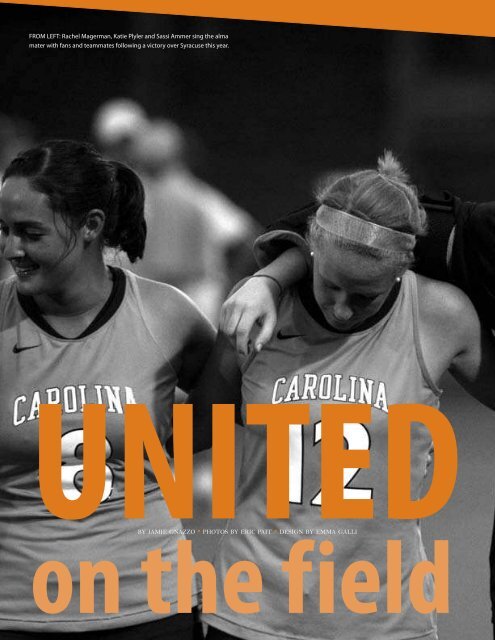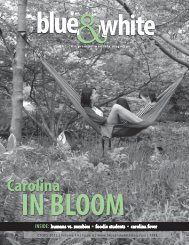then and now - Blue & White Online
then and now - Blue & White Online
then and now - Blue & White Online
You also want an ePaper? Increase the reach of your titles
YUMPU automatically turns print PDFs into web optimized ePapers that Google loves.
FROM LEFT: Rachel Magerman, Katie Plyler <strong>and</strong> Sassi Ammer sing the almamater with fans <strong>and</strong> teammates following a victory over Syracuse this year.tThe players on the field at Francis E. Henry stadium arepart of a legacy, a dynasty that boasts six NCAA championship victoriessince 1989. The stadium is home to one of the most successfulIn stark contrast to its athletic success lies the relative anonymitysports teams at UNC-Chapel Hill, but ask students around campuswhat team dominates that field <strong>and</strong> maybe a h<strong>and</strong>ful would k<strong>now</strong> theanswer.of the UNC-CH women’s field hockey team. Not only has the teamwon an impressive number of NCAA titles, but it also claims ownershipto 16 ACC championships. Yet, as unique as its record makes it,the women’s team has another unusual claim to fame: its diversity.Five girls playing for Carolina hail from countries other than theUnited States, girls who have traveled thous<strong>and</strong>s of miles, <strong>and</strong> evenacross oceans, to play a sport they love.Redshirt freshman Samantha Travers, sophomore SineadLoughran <strong>and</strong> junior Katie Ardrey each chose to enroll at Carolina toenjoy an international college experience <strong>and</strong>, of course, to play fieldhockey. Two true freshman, Sassi Ammer <strong>and</strong> Sophie Rudolph callGermany home. Not only do these girls juggle the intense pressure ofcollegiate athletics with university education, but they’ve also adjustedto a new lifestyle <strong>and</strong> culture associated with living abroad.“Coming from a Third World country to (America) is very different,”says Travers, a native of Zimbabwe. “I’ve been here for a year <strong>and</strong>a half, <strong>and</strong> it still affects me how different our culture is compared toAmerican culture.”Travers’ childhood could be described as nothing short of anadventure. “I live on a ranch, <strong>and</strong> we breed black rhinos, so as you canimagine I have a lot of interesting experiences,” she says. Extraordinarypets were par for the course. Travers has owned a rhino, awarthog <strong>and</strong> even a hyena.Kids play field hockey from a young age in Zimbabwe <strong>and</strong> Traverswas no exception. Her skill on the field led the Carolina coachingstaff to offer her a position on the team. Once in Chapel Hill, Traverssaid that balancing school work <strong>and</strong> field hockey practice was difficult,but the resources available to student athletes have eased theburden.Even membership on one of Carolina’s most successful teamsdoesn’t bring her any closer to home. “There’s a lot of homesickness<strong>and</strong> the time difference is so large that it’s hard to keep in contactwith my family,” Travers says.Sophomore Sinead Loughran is slightly closer to her home countryof Irel<strong>and</strong>. “I’m fortunate enough that my family is able to fly outhere <strong>and</strong> see me every once in a while, but my friends can’t,” she says.For Loughran, it’s the time apart from friends that makes the transitiondifficult. “Facebook <strong>and</strong> Skype are great for keeping in contact,but it’s hard not to feel like you’re missing out or being forgotten.”However, Loughran doesn’t regret one second of her internationalexperience. She says coming to the United States for college has beenone of the best choices of her life. It has given her “a chance to see theworld <strong>and</strong> meet new people outside (my) own fishbowl.”Coming to UNC-CH, Loughran found that the American collegelifestyle is far different from what one could expect in Irel<strong>and</strong>.While most Irish students live with their parents throughout theirUNITEDonbythejamie gnazzo • photos by eric pait • designfieldby emma galliThe women’s field hockey players, some ofwhom hail from as far away as Zimbabwe,serve as each others’ surrogate families asthey work toward the program’s 7th NCAAchampionship.22 September 2011 www.blue<strong>and</strong>whitemag.com 23



